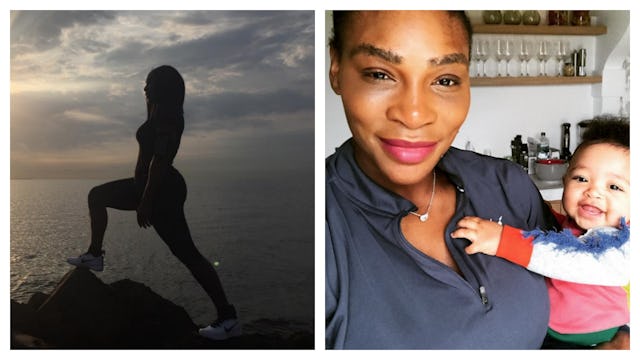Why Serena Williams' Comments About Mental Health Are So Important

When Serena Williams, a worldwide tennis superstar, opened up about the ways childbirth had impacted her emotions and mental health, I felt closer to her than I had to a celebrity, well, ever.
“Last week was not easy for me. Not only was I accepting some tough personal stuff, but I just was in a funk. Mostly, I felt like I was not a good mom. I read several articles that said postpartum emotions can last up to 3 years if not dealt with. Talking things through with my mom, my sisters, my friends let me know that my feelings are totally normal,” wrote Williams in an Instagram post.
Williams got candid about baby blues, as well as juggling doubts on motherhood in general, and her words resonated with me. Truth be told, Williams has always been comfortable talking about the emotional ebbs and flows, like depression and anxiety, that she’s experienced in her life. And that level of transparency was new to me as a Black woman.
I have cycled in and out of depression and anxiety for as long as I can remember, but as a Black woman, I have always felt like there are few spaces for me to discuss this. Black people, Black mothers in particular, are expected to be emotionless and strong, impenetrable forces.
Fortunately, more and more Black celebrities, like Williams, are bringing awareness to the ways mental health impacts Black Americans. And their candor is providing solidarity and comfort to Black women, like me, who battle depression and anxiety.
The Data on Black Mental Health
For a long time, researchers didn’t even study the ways mental health affected Black Americans. Thankfully, now more research includes Black Americans.
The first finding is not that surprising. Black Americans are one of the least likely groups to seek mental health assistance. Instead, we are more likely to seek guidance through church and our faith.
The second finding is a lot more difficult to stomach. Black Americans are substantially more likely to have undiagnosed mental health challenges that impair their functioning in everyday life. Recent research suggests that prolonged exposure to the chronic stress that accompanies racism is the missing link that answers why the Black community has higher rates of infant/maternal mortality, as well as many other health issues.
The Obstacles to Black Mental Health Care
Coverage and cost are two significant obstacles for Black Americans seeking mental health assistance. The individuals who need help the most are least likely to have the resources to get help. Black Americans are significantly more likely to have jobs that don’t have adequate health insurance or paid time off.
Of course, not all Black people are broke. In 2018, there are many middle-class Black Americans, as well as Black millionaires and a handful of Black billionaires. But money is not enough to create cultural competency within an industry.
A huge obstacle for Black Americans who seek mental health assistance is finding a mental health professional that has an understanding of the cultural customs for and challenges that plague Black Americans. Imagine selecting a mental health professional to discuss the way racism has been a heavy burden on your life and they aren’t familiar with racism and implicit bias. Just imagine.
There are also intracommunity obstacles. Social scripts and media portrayals interact, leaving many people of color to overlook the importance of acknowledging, monitoring, and treating mental health complications. As a result, we often suffer in silence as we are muted by an oppressive system. This is especially true for Black women who are often left carrying the weight of our entire community.
The Solution to Black Mental Health
Sadly, finding a solution is challenging. Increasing access to mental health services for Black Americans by increasing the minimum wage, providing universal health care, and prioritizing mental health in general would help all citizens. The bad news is, our nation is not likely to make these changes anytime soon.
However, we do see progress when Black celebrities, like Serena Williams, discuss the importance of normalizing mental health discussion and treatment. In order for Black Americans to get the assistance that we need, it is vital to completely shed the stigma and stereotypes surrounding mental health assistance within our community.
As a community, we need to reject narratives suggesting “Black people don’t x,y,z.” We are not immune to the highs and lows that come with life. If anything, we are more susceptible to them. Let’s put ourselves first and prioritize mental health for our community, our children, and ourselves.
This article was originally published on